
About this edition
In this edition we feature RePLiCal, our retention time standard for HPLC that is based on QconCAT technology.
The standard is implemented in Skyline. Watch our tutorial to learn how use the RePLiCal retention time standard to adapt for RT shifts using Skyline.
We are also proud to announce the launch of a new product, the QconCAT Kit for detection and quantification of plasma proteins associated to cardiovascular diseases. As we celebrate the 15th anniversary of PolyQuant, we would like to thank our customers with a special discount on QconCATs and Calibration Standards.

Benefit from our time-limited promotion and receive high-quality products for proteomics at lowest price. Save 15% on custom-made QconCAT reference standards for your quantitative proteomics project. Our experienced team will assist you with finding the optimal QconCAT for your proteomics project.
Get the most out of your budget and save up to 50% on our HPLC and MS Calibration Standards. Contact us by E-mail at info@polyquant.de or submit your request using our QconCAT inquiry form or our calibration standards order form.
Featured application: RePLiCal – retention time standard for HPLC
RePLiCal is specifically designed for retention time standardization and normalization in reversed-phase LC-MS analysis (original publication).

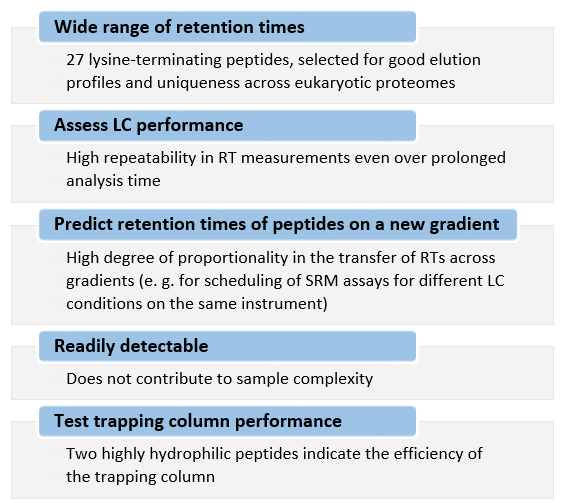
RePLiCal is available as synthetic protein or as peptide mix.
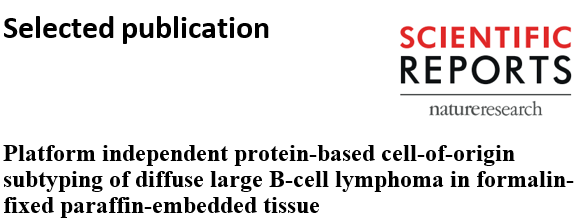
Reinders J, Altenbuchinger M, Limm K, Schwarzfischer P, Scheidt T, Strasser L, Richter J, Szczepanowski M, Huber CG, Klapper W, Spang R, Oefner PJ
Sci Rep. 2020 May 12;10(1):7876. [PubMed]
Reinders et al. applied label-free nano-liquid chromatography – Sequential Window Acquisition of all Theoretical fragment-ion spectra – mass spectrometry (nanoLC-SWATH-MS) to identify an eight-protein signature for the molecular classification of diffuse large B-cell lymphoma (DLBCL), providing a complementary (protein-based) method to the commonly used gene expression profiling. In their study Reinders et al. used RePLiCal to adjust the retention times of the detected peptides to those contained in the peptide library.
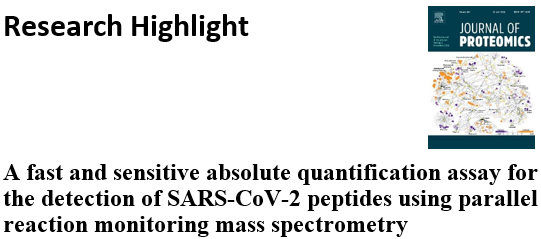
Gajbhiyea A, Nalbanta A, Heunisa T, Sidgwick F, Porter A, Tahab Y, Trost M
Journal of Proteomics, Vol. 265, 15 August 2022. [PubMed]
Gajbhiyea et al. developed a high-throughput PRM-MS assay to directly detect viral peptides in nasopharyngeal swab samples. The assay enables sensitive detection and absolute quantification of SARS-CoV-2 nucleocapsid peptides with short turn-around times by using an isotopically labelled synthetic polypeptide as reference standard (available from PolyQuant: http://polyquant.de/cov-ms-peptide-standard/).
QconCAT Kit – Cardiovascular Diseases
We have developed a QconCAT kit based on quantitative proteomics results produced during our collaboration with the TransCard project, a multidisciplinary research consortium of two SMEs and four academic partners studying the molecular origin of disturbed LDL, triglyceride and/or HDL metabolism, correlated with cardiovascular disease (CVD). The QconCAT kit comprises of 4 QconCAT polypeptides providing 211 reference peptides for detection and absolute quantification of 47 plasma proteins linked to cardiovascular diseases. The kit is designed for application in human, mouse and rat samples by using peptides that are shared between all three organisms. More information about the kit, pricing and how to order can be found here.
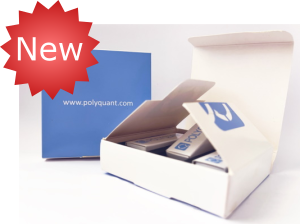
YPIC Challenge #3
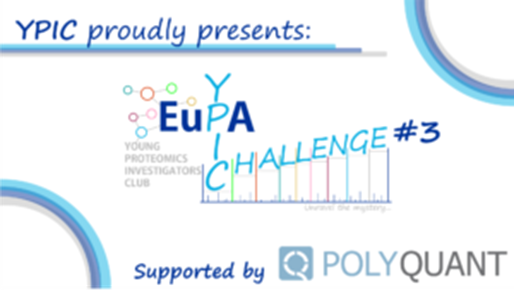
For all investigators currently solving the YPIC Challenge #3:
The deadline for submitting your manuscript has been extended to August 1st, 2022. If you need help, hints will follow soon (https://twitter.com/EU_YPIC).
The winning manuscript will be selected based on creativity, originality and effort trying to solve the hidden message. Partial solutions are also accepted. For more information you can also visit http://eupa.org/ypic/the-challenge/.



